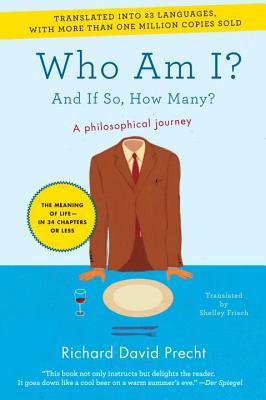Kindle Notes & Highlights
We should never stop asking questions, because a combination of learning and enjoyment is the key to a fulfilled life. Learning without enjoyment wears you down, and enjoyment without learning is mind-numbing.
“It is a good ability to be able to observe one’s condition with an artistic eye and even in pain and suffering, awkwardness, and matters of that sort to have the Gorgon gaze that instantaneously petrifies everything into a work of art.”
Man is a clever animal with an overinflated sense of self, and a mind focused not on the great truths, but only on life’s minutiae.
“We are unknown to ourselves, we men of knowledge—and with good reason. We have never sought ourselves—how could it happen that we should ever find ourselves?”
“Our treasure is where the beehives of our knowledge are. We are constantly making for them, being by nature winged creatures and honey-gatherers of the spirit; there is one thing alone we really care about from the heart—‘bringing something home.’ ”
Arthur Schopenhauer: “We are simply temporal, finite, transient, dreamlike, fleeting beings like shadows.
Our knowledge derives first and foremost from our senses. We cannot register what we cannot hear, see, feel, taste, and touch; hence it does not enter into our world. Even the most abstract things have to be read or seen in the form of signs to enable us to imagine them.
Human consciousness was shaped not by a burning desire for truth but by an attempt to survive and move ahead.
“We have never sought ourselves—how could it happen that we should ever find ourselves?”
What path should we take? What method should we use? And what might we find at the end?
So our first question is: Where does our brain come from, and why is it constructed the way it is?
And within the cerebral cortex, it is above all the regions that are important for orientation in space, musicality, and powers of concentration that continue to develop.
Since man had developed from the lower animals, MacLean postulated that the different regions of the human brain corresponded to the different stages of human development. In his model, the brain is actually made up of three distinct brains. The first is a primitive reptilian brain, which consists primarily of the brain stem and the cerebellum and constitutes the “lowest” form of the brain, where innate instincts are located.
He called the second brain the “paleomammalian brain” and argued that it corresponded to the limbic system—the locus not only of instinctual drives and emotions but also of nature’s early attempt to develop a consciousness and a memory. The third brain, the “neomammalian brain,” corresponds to the neocortex as the seat of reason, understanding, and logic.
Feelings and intellect, he claimed, are controlled by two different brains, which helped explain why our intellect has so much trouble exercising control over our feelings.
The human brain is not made up of three essentially independent brains.
Today the brain is divided up into the brain stem, the diencephalon, the cerebellum, and the cerebrum.
The brain stem, located in the middle of the head, constitutes the lowest segment of the brain and consists of the midbrain, the pons, and the medulla oblongata. The brain stem communicates sense impressions and coordinates our involuntary movements, such as heartbeat, breathing, and metabolism, and our reflexes, including blinking, swallowing, and coughing.
The diencephalon is a relatively small area above the brain stem, consisting of the upper part of the thalamus, the hypothalamus, the subthalamus, and the epithalamus. Its role is essentially that of an agent and emotional evaluator. It registers sense impressions...
This highlight has been truncated due to consecutive passage length restrictions.
hormones, the diencephalon controls our sleeping and waking, our sensations of pain, the regulation of our body temperature, and our drive...
This highlight has been truncated due to consecutive passage length restrictions.
The cerebellum has a major influence on our motility and our motor learning. In other vertebrates it is much more prominent than in man, especially in fish, whose movements somehow seem more sophisticated than those of humans. In our species, the cerebellum also governs unconscious tasks involving cognitive ...
This highlight has been truncated due to consecutive passage length restrictions.
the “simpler” sensory areas and the “higher” associative areas. All complex human mental functions depend heavily,
though not exclusively, on the activity of the associative cortex.
There can be no doubt that all our knowledge begins with experience. For how should our faculty of knowledge be awakened into action did no
objects affecting our senses partly of themselves produce representations, partly arouse the activity of our understanding to compare these representations, and, by combining or separating them, work up the raw material of the sensible impressions into that knowledge of objects which is entitled experience?
Our attentiveness determines our feelings and thoughts, just as our feelings and thoughts d...
This highlight has been truncated due to consecutive passage length restrictions.
People can focus on only one thing at a time; so-called multitasking does not mean that we are able to concentrate on several things at once, but only t...
This highlight has been truncated due to consecutive passage length restrictions.
not the sum of our neurons but our attention span that limits our learning ability.
not consider anything true that could not be recognized clearly and distinctly.
I think, therefore I am!
to accept as correct only what is proved by an unassailable case built up step by step.
Descartes had provided an answer to the question of how I know who I am: It is by virtue of my thinking.
The proposition ‘I think, therefore I am’ may be famous, but it has an unfortunate connotation. Not only does it say that I know about myself and my existence only by means of thinking, but it also suggests that thinking and the awareness of thinking are the actual foundations of existence.


